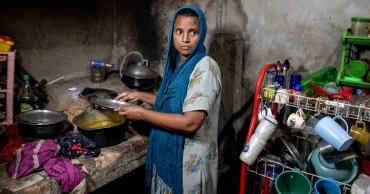debt
Sri Lanka has exited debt default, official says; Fitch upgrades rating to CCC+
Sri Lanka's Secretary to the Treasury, Mahinda Siriwardana, announced on Saturday that the country has officially emerged from sovereign default.
In a post on X, Siriwardana emphasized the importance of avoiding past policy errors influenced by rigid ideologies, unfounded beliefs, or misleading narratives, which often lead to unrealistic and unsustainable decisions.
Sri Lankan envoy discusses trade opportunities with BGMEA
With economic stability now restored, he highlighted the need to prioritize strategies that encourage inclusive and sustainable development. Siriwardana stressed that such initiatives are vital for job creation and income generation, aiming to support the recovery of all Sri Lankans.
His remarks came after Fitch Ratings upgraded Sri Lanka's credit rating to "CCC+." The upgrade was attributed to the country's progress through a difficult path involving substantial reforms and a complex debt restructuring process.
Sri Lanka's Marxist-leaning president appoints his Cabinet after a resounding election win
On Friday, Fitch Ratings announced the improvement of Sri Lanka's Long-Term Foreign-Currency Issuer Default Rating, elevating it from Restricted Default to "CCC+." The decision was supported by successful restructuring of international sovereign bonds and stronger macroeconomic indicators.
1 year ago
Low revenue collection hampers debt management, Finance Ministry doc says
The Finance Ministry has highlighted low revenue collection as a major obstacle to effective debt management, restricting the government's ability to invest in infrastructure and development projects.
According to a document from the ministry, the lower revenue-to-GDP ratio adversely impacts debt sustainability. "This issue is further exacerbated by the LDC graduation deadline in 2026, which will affect the country's access to concessional financing from international sources," the document states.
The finance ministry's document, titled ‘Medium Term Macroeconomic Policy Statement (2023-24 to 2025-26)’, also identifies the high-interest rate environment both domestically and internationally as another significant challenge. This situation is increasing borrowing costs and straining public finances.
Despite zero investment, govt earning Tk14 crore revenue from Nagad: Palak
The rising need for government funding to support critical infrastructure, social safety nets, and other development initiatives compounds the problem. Additionally, the presence of segmented debt offices within various agencies has created coordination challenges in debt management, potentially affecting the country's fiscal sustainability.
Recommendations for Improvement
To address these challenges, the Finance Ministry recommends a comprehensive and integrated approach to debt management, improved revenue collection, and exploring alternative financing mechanisms to reduce reliance on debt.
It is crucial to address these issues promptly to ensure that the country's public debt remains sustainable, the document asserts.
Steps Toward Financial Efficiency
The Finance Division has already undertaken measures to enhance the efficiency and transparency of the financial system. One key initiative is the introduction of secondary market transactions of government securities, facilitated by a memorandum of understanding (MoU) signed among Bangladesh Bank, the Bangladesh Securities and Exchange Commission (BSEC), the Dhaka Stock Exchange (DSE), the Central Depository Bangladesh Limited (CDBL), and the Central Counterparty Bangladesh Limited (CCBL).
Despite zero investment, govt earning Tk14 crore revenue from Nagad: Palak
This move aims to increase the scope and depth of the secondary bond market, allowing both institutional and household investors to participate in government securities transactions. It is expected to help finance the government’s deficit more efficiently and contribute to capital market development and overall economic growth.
Additional Reforms
The automation of the National Savings Certificate (NSC) issuance process represents another critical reform aimed at increasing efficiency and reducing paperwork. This measure supports the implementation of policy measures such as slab-based interest rates and individual investment ceilings, aligning with the government’s financing strategy and reducing investment in NSC.
Furthermore, the publication of the Debt Bulletin ensures transparency in debt data, benefiting various stakeholders including other ministries, research organizations, the business community, the international community, and the general public.
34% of Bangladesh's revenue spent on debt repayment: CPD
Moderate Debt Levels, Significant Challenges
Despite Bangladesh maintaining a moderate level of public debt and a low risk of external debt distress due to strong growth and prudent macroeconomic management, the document stresses that significant challenges remain. Addressing these challenges is essential to maintaining sustainable public debt and supporting the country's development objectives.
1 year ago
Davos 2024: Can AI provide solutions, as Global leaders confront $88.1 trillion debt crisis?
This week, the picturesque Swiss town of Davos becomes the epicenter of global policy discussions as world leaders convene to address a plethora of critical issues. High on their agenda are two ongoing major wars, a burgeoning shipping crisis, and the ever-increasing threat of cyber-attacks.
Complicating these discussions, however, is the staggering $88.1 trillion global debt burden, a figure reported by CNN. This unprecedented surge, predominantly fueled by public borrowing during the pandemic, now significantly undermines governments’ capabilities to tackle existing and emerging global crises effectively.
The soaring debt servicing costs not only strain public services, already reeling from successive budget cuts, but also limit efforts to combat climate change and provide adequate care for aging populations.
UN council to hold first meeting on potential threats of artificial intelligence to global peace
The risk looms larger as governments might find themselves unable to borrow more to fulfill existing obligations and fund essential services, says the report.
Former Bank of England’s monetary policy committee member, Michael Saunders, warned that a government unable to finance its debt could face abrupt and painful spending cuts or tax hikes, hampering its response to future shocks, it also said.
As the world faces a risky year of elections with half the global population heading to the polls, there is little incentive for belt-tightening among incumbent administrations. The prospect of new leaders implementing ambitious tax and spending plans raises concerns about the sustainability of already soaring levels of public debt, the report said.
In the United States, record levels of public borrowing have become a major point of contention between Republicans and Democrats, affecting national budget negotiations and jeopardizing the functioning of federal agencies, it said.
China warns of artificial intelligence risks, calls for beefed-up national security measures
The implications of mounting debt are not limited to economic challenges. Political polarization has already impacted the credit rating of the United States, with agencies like Fitch downgrading its rating. Moody’s has also warned about the potential removal of the country’s last remaining perfect rating.
Amidst these challenges, the increased cost of servicing debt, driven by rising interest rates, is diverting significant funds away from essential public services. In the UK, the Labour Party has scaled back green spending plans due to concerns about adding to the country's debt burden, the report further stated.
As the global economy grapples with these debt challenges and slowing economic growth, some experts, including Raghuram Rajan, former governor of the Reserve Bank of India, suggest that artificial intelligence (AI) could hold the key to a relatively painless recovery.
They hope for discussions at Davos to shed light on potential solutions, emphasizing the transformative power of an AI-driven productivity boom to reshape the world’s economic fortunes.
UN chief warns of risks of artificial intelligence
2 years ago
Debt ceiling: Biden, McCarthy to meet Monday as negotiators ‘keep working’ to resolve standoff
The White House and House Republicans wrapped up another round of debt ceiling talks Sunday as Washington races to strike a budget compromise along with a deal to raise the nation's borrowing limit and avert an economy-wrecking federal default.
President Joe Biden and House Speaker Kevin McCarthy spoke by phone Sunday while the president was returning home on Air Force One after the Group of Seven summit in Japan. Upbeat, McCarthy, R-Calif., told reporters at the Capitol that the call was "productive" and that the on-again, off-again negotiations between his staff and White House representatives are focused on spending cuts.
Biden and McCarthy are set to meet for a pivotal meeting Monday at the White House.
Also Read: Debt limit standoff brings tough talk, little action as Biden, world leaders watch for progress
Negotiators for the Democratic president and Republican speaker met for 2 1/2 hours at the Capitol as talks appear to be narrowing on a 2024 budget year cap that would be key to resolving the standoff. "We'll keep working," said Steve Ricchetti, counselor to the president, as the White House team exited. The Republicans were not seen leaving the speaker's office and offered no immediate comment after the talks.
They all face a deadline, as soon as June 1, when the government could run out of cash to pay its bills. Treasury Secretary Janet Yellen said Sunday that June 1 is a "hard deadline."
McCarthy said after his call with Biden that "I think we can solve some of these problems if he understands what we're looking at." The speaker added, "But I've been very clear to him from the very beginning. We have to spend less money than we spent last year."
Also Read: Biden aims to reassure world on US debt standoff as he consults with Indo-Pacific leaders
McCarthy emerged from that conversation sounding optimistic and was careful not to criticize Biden's trip, as he had before. He did caution, "There's no agreement on anything."
"We're looking at, how do we have a victory for this country?" McCarthy said. He said he did not think the final legislation would remake the federal budget and the country's debt, but at least "put us on a path to change the behavior of this runaway spending."
The White House confirmed the Monday meeting and late Sunday talks but did not elaborate on the leaders' call.
Earlier, Biden used his concluding news conference in Hiroshima, Japan, to warn House Republicans that they must move off their "extreme positions" over raising the debt limit and that there would be no agreement to avoid a catastrophic default only on their terms.
Biden said "it's time for Republicans to accept that there is no deal to be made solely, solely, on their partisan terms." He said he had done his part in attempting to raise the borrowing limit so the government can keep paying its bills, by agreeing to significant cuts in spending. "Now it's time for the other side to move from their extreme position."
Also Read: Biden scraps planned visit to Australia, Papua New Guinea to focus on debt limit talks
Biden had been scheduled to travel from Hiroshima to Papua New Guinea and Australia, but cut short his trip in light of the strained negotiations with Capitol Hill.
Even with a new wave of tax revenue expected soon, perhaps giving both sides more time to negotiate, Yellen said on NBC's "Meet the Press" that "the odds of reaching June 15, while being able to pay all of our bills, is quite low."
GOP lawmakers are holding tight to demands for sharp spending cuts with caps on future spending, rejecting the alternatives proposed by the White House for reducing deficits in part with revenue from taxes.
Republicans want to roll back next year's spending to 2022 levels, but the White House has proposed keeping 2024 the same as it is now, in the 2023 budget year. Republicans initially sought to impose spending caps for 10 years, though the latest proposal narrowed that to about six. The White House wants a two-year budget deal.
A compromise on those topline spending levels would enable McCarthy to deliver for conservatives, while not being so severe that it would chase off the Democratic votes that would be needed in the divided Congress to pass any bill.
Top Republican negotiator Rep. Garret Graves of Louisiana, speaking alongside McCarthy at the Capitol, said the numbers "are the foundation" of any agreement.
Republicans also want work requirements on the Medicaid health care program, though the Biden administration has countered that millions of people could lose coverage. The GOP additionally introduced new cuts to food aid by restricting states' ability to waive work requirements in places with high joblessness. That idea, when floated under President Donald Trump, was estimated to cause 700,000 people to lose their food benefits.
GOP lawmakers are also seeking cuts in IRS money and, by sparing Defense and Veterans accounts from reductions, would shift the bulk of spending reductions to other federal programs.
The White House has countered by keeping defense and nondefense spending flat next year, which would save $90 billion in the 2024 budget year and $1 trillion over 10 years.
All sides have been eyeing the potential for the package to include a framework that would speed energy project developments.
And despite a push by Republicans for the White House to accept parts of their proposed immigration overhaul, McCarthy indicated the focus was on the House's previously approved debt and budget package.
"I think that we can reach an agreement," Biden said, though he added this about Republicans: "I can't guarantee that they wouldn't force a default by doing something outrageous."
Republicans had also rejected various White House revenue proposals. Among the proposals the GOP objects to are policies that would enable Medicare to pay less for prescription drugs. Republicans also have refused to roll back Trump-era tax breaks on corporations and wealthy households as Biden's own budget has proposed.
For months, Biden had refused to engage in talks over the debt limit, contending that Republicans in Congress were trying to use the borrowing limit vote as leverage to extract administration concessions on other policy priorities.
But with the June 1 potential deadline looming and Republicans putting their own legislation on the table, the White House launched talks on a budget deal that could accompany an increase in the debt limit.
Biden's decision to set up a call with McCarthy came after another start-stop day with no outward signs of progress.
The president tried to assure leaders attending the meeting of the world's most powerful democracies that the United States would not default. U.S. officials said leaders were concerned, but largely confident that Biden and American lawmakers would resolve the crisis.
The president, though, said he was ruling out the possibility of taking action on his own to avoid a default. Any such steps, including suggestions to invoke the 14th Amendment as a solution, would become tied up in the courts.
"That's a question that I think is unresolved," Biden said, adding he hopes to try to get the judiciary to weigh in on the notion for the future.
2 years ago
On avg, each Bangladeshi family had loans amounting to Tk 70506 in 2022: BBS Survey
The average loan amount of each family in Bangladesh was Tk 70,506 in 2022, up from Tk 37,743 in 2016, according to Bangladesh Bureau of Statistics (BBS) data shared recently.
One-third of households in Bangladesh are now in debt. This information has emerged in the latest household income-expenditure survey of BBS.
According to the survey, 37 percent of the country’s households have taken loans or borrowed money last year.
Read more: Bangladesh's literacy rate rises to 74 percent, poverty down by 5.6 percent: Survey
During the survey – from January to December last year, an average of 37.03 percent of households reported taking loans or borrowing money. In the 2016 survey, 29.70 percent of the households were borrowing.
As such, in 6 years, the borrowing of families in the country has increased by more than 7 percent.
Last Wednesday, BBS published the preliminary results of Household Income and Expenditure Survey 2022.
Read more: Bangladesh’s total labour force is 7.34 crore, 26.3 lakh are jobless: BBS
More rural households in debt than in cities
According to the BBS survey, more households in the villages are in debt than in cities.
In rural areas, an average of 39.35 percent of families are in debt. In urban areas, this percentage is 32.11.
In 2016, the average household debt in urban areas was 22.10 percent. And in rural areas that percentage was 32.70.
Read more: Inflation rises to 9.33 percent in March, highest in 7 months
In 2022, the number of households in debt increased by an average of 10 percent in urban areas, and by 6.5 percentage in rural areas, the BBS survey stated.
2 years ago
US to max out on debt soon, setting up political fight
The federal government is on track to max out on its $31.4 trillion borrowing authority as soon as this month, starting the clock on an expected standoff between President Joe Biden and the new House Republican majority that will test both parties' ability to navigate a divided Washington, with the fragile global economy at stake.
Once the government bumps up against the cap — it could happen any time in the next few weeks or longer — the Treasury Department will be unable to issue new debt without congressional action. The department plans to deploy what are known as “extraordinary measures” to keep the government operating. But once those measures run out, probably mid-summer, the government could be at risk of defaulting unless lawmakers and the president agree to lift the limit on the U.S. government's ability to borrow.
The expected showdown over the debt limit would be a stark display of the new reality for Biden and Democrats, who enjoyed one-party control of Washington for the past two years. It would presage the challenges to come in achieving even the modest ambitions that Democrats are bringing to the task of legislating in a divided Capitol.
Read more: US economy likely returned to growth after shrinking in first 2 quarters of 2022
The White House has insisted that it won't allow the nation's credit to be held captive to the demands of newly empowered GOP lawmakers. But the concessions made by new House Speaker Kevin McCarthy in his arduous path to securing the job raise questions about whether he has the ability to cut any kind of deal to resolve a standoff.
McCarthy, who only secured his post after 15 rounds of voting and major compromises with hard-line members of his caucus, has said that his fellow Republicans will only agree to increase the debt ceiling in return for spending cuts of unspecified magnitude. And a new rule that allows any one lawmaker to trigger a vote for McCarthy's removal could make even the most urgent of votes a dicey matter.
McCarthy said he’s spoken with Biden about the coming debt ceiling and told the president “it doesn’t have to come to that” — meaning a federal government shutdown over spending levels.
“This is our moment to change the behavior,” McCarthy said Tuesday on Fox’s “Hannity.”
But the new speaker stopped short of saying Republicans now in charge of the House would go so far as to refuse to pass the annual spending bills needed to fund the government, as happened more than a decade ago during an earlier debt ceiling showdown in Congress.
“We’re going to look at every single dollar spent,” McCarthy said.
The stakes are treacherous. Past forecasts suggest a default could instantly bury the country in a deep recession, right at a moment of slowing global growth as the U.S. and much of the world face high inflation because of the pandemic and Russia’s invasion of Ukraine.
Read more: US economy shrinks for a 2nd quarter, raising recession fear
The White House has ruled out executive action to stave off a default.
“Congress is going to need to raise the debt limit without — without — conditions and it’s just that simple,” White House press secretary Karine Jean-Pierre said recently. “Attempts to exploit the debt ceiling as leverage will not work. There will be no hostage taking.”
On Capitol Hill, Republican Rep. Chip Roy of Texas, one of the McCarthy holdouts and an outspoken critic of government spending, wouldn't rule out trying to oust McCarthy if he fails to live up to his pledge to seek spending cuts along with any debt limit increase.
“We will use the tools of the House to enforce the terms of the agreement,” Roy told CNN on Sunday.
Rep. Bob Good, R-Va., said in a Fox News interview on Monday that the debt limit will be “the real test” for conservatives. Republicans have to begin “leveraging power to accomplish what you need to accomplish," he said. Good fought McCarthy’s bid to become speaker until the final vote, when he responded “present.”
The debt ceiling debate is a form of political theater — it encourages lawmakers to engage in brinkmanship in the name of fiscal responsibility — though past showdowns have done little to meaningfully alter the long-term rise in federal debt.
House Republican leaders liken the debt ceiling to a credit card limit, promising to put “mechanisms in place so that you don’t keep maxing it out,” in the words of House Majority Leader Steve Scalise of Louisiana.
“We’re going to confront this and I think the American people have called on us to confront this,” said Scalise.
Any effort to compromise with House Republicans could force Biden to bend on his own priorities, whether that's the funding of the IRS to ensure that wealthier Americans pay what they owe, or domestic programs for children and the poor.
It's hard to peg the exact date when the government will hit its debt ceiling, because payments and receipts vary from day to day, especially with the April filing deadline for income taxes. The current balance suggests the debt ceiling could be reached as early as this week or as late as March.
When Treasury takes extraordinary measures to keep the government running, it can halt contributions to pension funds and borrow from accounts to manage changes in the foreign exchange rate, freeing up cash to meet its other obligations.
Treasury first used these measures in 1985 and has used them at least 16 times since, according to the Committee for a Responsible Federal Budget, a fiscal watchdog. But the extraordinary measures only work for so long, and would likely run out — and put the U.S. at risk of default — sometime around the summer.
If the government were to default, financial markets could be expected to crash. Several million workers could be laid off. The world could feel the aftershocks of the crisis for years to come. Moody's Analytics called this risk “cataclysmic” in a 2021 forecast ahead of the previous debt ceiling increase, suggesting that the resulting chaos would be due to government dysfunction, rather than the underlying health of the U.S. economy.
“Debt limit negotiations are always protracted and almost always contentious, and the political trends seem to make it likely that they will exacerbate those tendencies and will create a volatile situation," said Shai Akabas, director of economic policy at the Bipartisan Policy Center, which forecasts the so-called X-date when the government exhausts its extraordinary measures.
Akabas told the Associated Press the X-date has "likely moved forward" from this year's third quarter due to rising interest rates and a pause on student loan repayments recently extended by the Biden administration. A more precise date will become available when the Congressional Budget Office updates its outlook later this month.
Either way, lawmakers know the risks that they're taking with the livelihoods of people across the country by having this dispute. Economists have warned them plenty of times.
A 2013 Treasury report drew on the debt ceiling impasse in 2011, when Republicans had also just won a House majority. It outlined how impasses contribute to long-lasting scars on financial markets, noting that business and household confidence fell to levels that are typically only seen during recessions.
"It took months before confidence recovered, even though, ultimately, there was no default," the report said.
3 years ago
Developing countries face impossible trade-off on debt: UN
Spiralling debt in low and middle-income countries has compromised their chances of sustainable development, the UN trade facilitation agency has said.
Rebeca Grynspan, the head of UNCTAD, said between 70 and 85 percent of the debt that emerging and low-income countries are responsible for is in a foreign currency.
This has left them highly vulnerable to the kind of large currency shocks that hit public spending – precisely at a time when populations need financial support from their governments.
Speaking at the 13th UNCTAD Debt Management Conference in Geneva recently, Rebeca said so far this year, at least 88 countries have seen their currencies depreciate against the powerful US dollar, which is still the reserve currency of choice for many in times of global economic stress.
And in 31 of these countries, their currencies have dropped by more than 10 percent.
This has had a hugely negative impact on many African nations, where the UNCTAD chief noted that currency depreciations have increased the cost of debt repayments by the equivalent of public health spending in the continent.
Read more: UN reminds Bangladesh of commitments to free expression, peaceful assembly
A wave of global crises has led many developing countries to take on more debt to help citizens cope with the fallout.
Government debt levels as a share of GDP increased in over 100 developing countries between 2019 and 2021, said UNCTAD. Excluding China, this increase is estimated at $2 trillion.
"This has not happened because of the bad behaviour of one country. This has happened because of systemic shocks that have hit many countries at the same time," Rebeca said.
With interest rates rising sharply, the debt crisis is putting enormous strain on public finances, especially in developing countries that need to invest in education, health care, their economies and adapting to climate change.
As debt burdens rise, developing country governments end up in a vicious circle, unable to invest in achieving Sustainable Development Goals (SDGs) and grow their economies, making it even harder to pay their debts.
If a country defaults, the terms of debt restructuring are usually set by groups of creditors competing to get the best terms, rather than giving priority to economic and developmental concerns, or how sustainable it is to keep up with payments.
"To resolve these issues equitably, this needs to be done in a manner that maintains the debtor countries' ability to grow and meet its current and future debt obligations, while also fulfilling its commitments to the SDGs," Sri Lankan President Ranil Wickremesinghe said in a statement delivered by the country's permanent representative in Geneva Ambassador Gothami Silva.
Read more: ‘Friendship to all, malice towards none’: Bangabandhu's historic quote incorporated in UN resolution
UNCTAD said if the median increase in rated sovereign debts since 2019 were fully reflected in interest payments, then governments would pay an additional $1.1 trillion on the global debt stock in 2023, estimates show.
This amount is almost four times the estimated annual investment of $250 billion required for climate adaptation and mitigation in developing countries, according to a report from the UN agency.
3 years ago
Bangladesh has one of the lowest debt-to-GDP ratios: Finance Minister tells ADB
Finance Minister AHM Mustafa Kamal has said that Bangladesh has one of the lowest debt-to-GDP ratios in the world.
He said Bangladesh has never failed to pay domestic and foreign debt.
Kamal said this while attending the annual meeting at the Asian Development Bank (ADB) headquarters in Manila on Tuesday, according to a press release of the finance ministry.
Read: Market-based foreign exchange rate may be introduced soon: Finance Minister
The finance minister also attended a bilateral meeting with president of ADB, Masatsugu Asakawa.
The finance minister said that currently, the cumulative financing of ADB in Bangladesh stands at $27.6 billion. Out of this, total outstanding amount is $11.69 billion.
Kamal thanked ADB's assistance in developing member countries, including Bangladesh, in recovering from economic and health crises in Asia and the Pacific region by providing quick support for procuring Covid-19 vaccine.
Read: No IMF proposal received to raise power, petroleum prices: Finance Minister
It is very important that the Bangladesh-ADB Country Partnership Strategy (2021-2025) is aligned with Bangladesh's national development goals.
The finance minister expected $12-15 billion in loan support from ADB over the next five years, which is crucial for Bangladesh’s achieving development milestones.
3 years ago
When a retired ACC official in Brahmanbaria listened to his conscience
Travelling without a ticket may be a common offence.
But after travelling without tickets for many years, a 61-year-old retired Anti-Corruption Commission (ACC) official chose to listen to his conscience.
Emdadul Haque, a resident of Kanikara village in Nabinagar upazila, came back to Brahmanbaria railway station on Monday and paid Tk 2,350 to the station master.
"The amount was due to the railways as all these years I travelled without a ticket to Dhaka from the district. Now I will get peace of mind," said Emdadul.
Also read: Probe body formed over Natore train derailment
Chief booking assistant of Brahmanbaria railway station, Kabir Hossain Talukder, said he was really moved by Emdadul's gesture.
“We issued tickets worth Tk 2,530 for an intercity train, Mahanagar Provati, from Brahmanbaria to Chattogram so that Emdadul can 'repay his debt'. His honesty is an inspiration for all of us,” he said.
Emdadul’s son Imran said his father is basically a man of integrity.
“During the last year of service, he travelled to Dhaka from Brahmanbaria several times without a ticket but kept an account of it," he said.
Also read: Unmanned rail crossings are mostly to blame for rail accidents
3 years ago
In debt, Bogura farmer commits suicide
A 32-year-old farmer allegedly committed suicide by taking poison at Sogunia village in Sherpur upazila in Bogura, his family said on Thursday.
The deceased was identified as Abdul Karim, son of Juran Ali in Bishalpur union of the upazila.
Also read:Child killed as branch falls off tree in Bogura
Family members said Karim had borrowed loans from several NGOs and individuals. But due to the loss of paddy and other crops in the current season, he defaulted in repaying the loan. Meanwhile, creditors were pushing for money.
Karim took poison around 11 pm on Wednesday night, said the family.
He was rushed to Upazila Health Complex. Later, he was shifted to Shaheed Ziaur Rahman Medical College in Bogura where he died while undergoing treatment there.
Also read: Case filed over killing Bogura Polytechnic student
The body was handed over to the family after completing the legal procedures, said Rabiul Islam, sub-inspector (SI) of Sherpur Police Station.
An unnatural death case has been lodged at Bogra Sadar Police Station in this regard, added the SI.
3 years ago

















